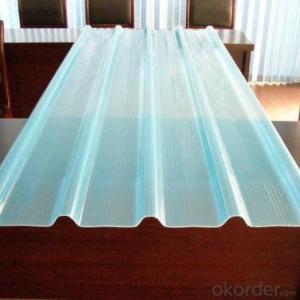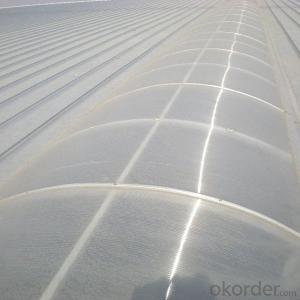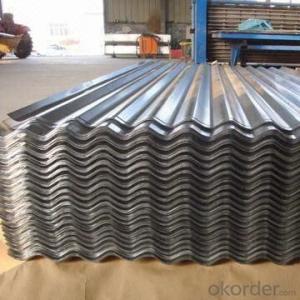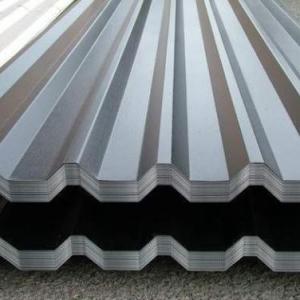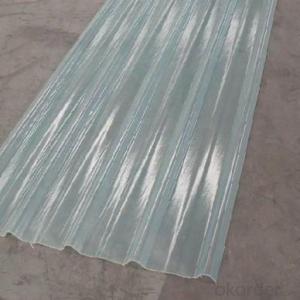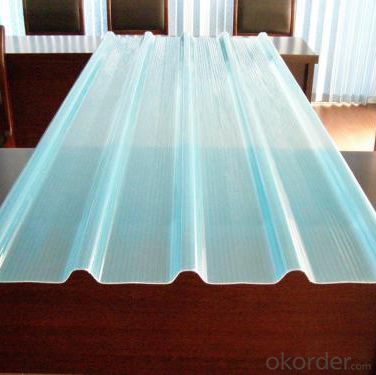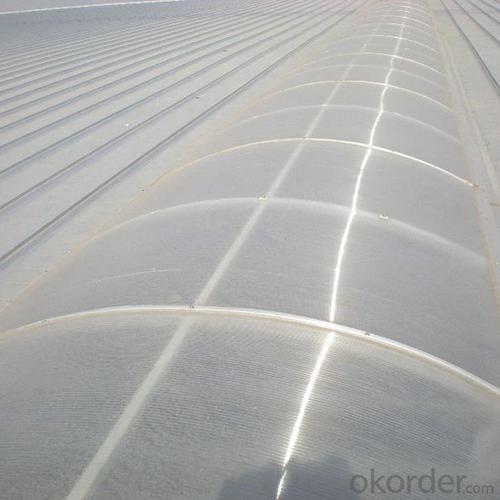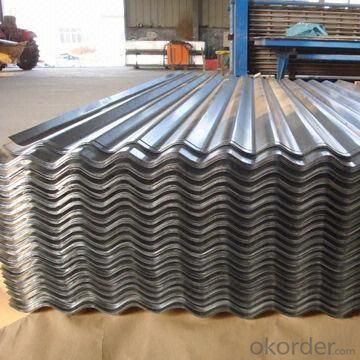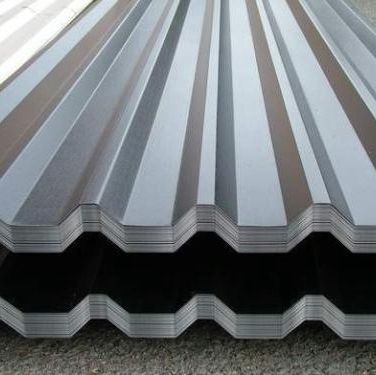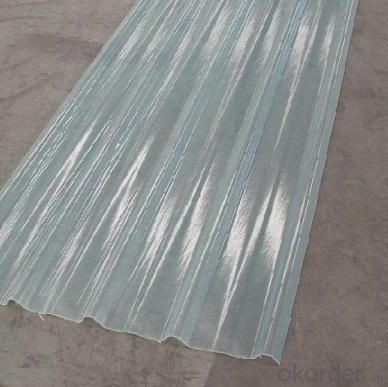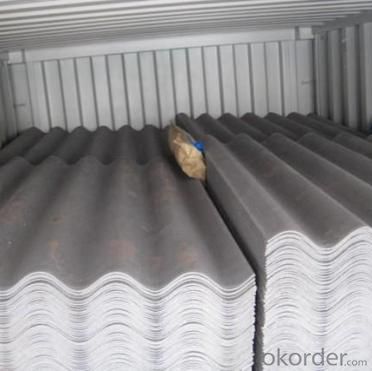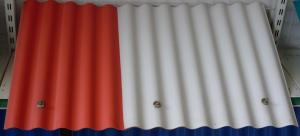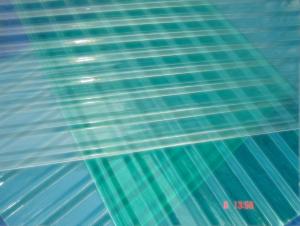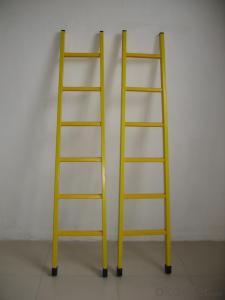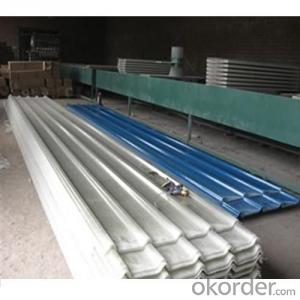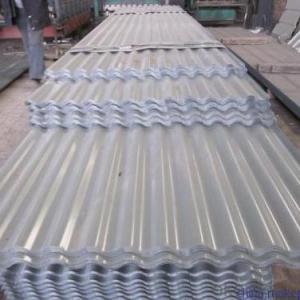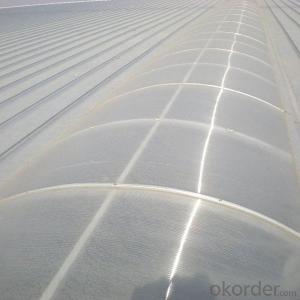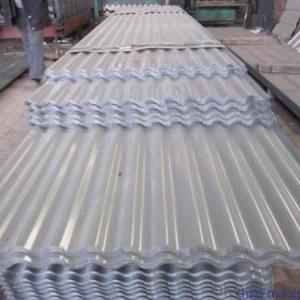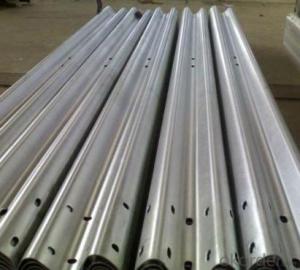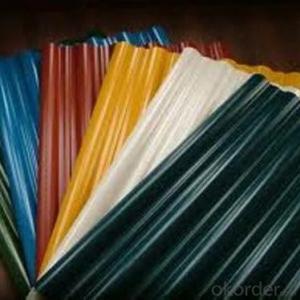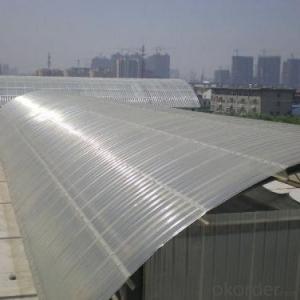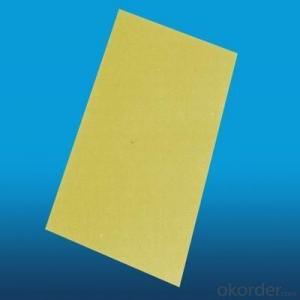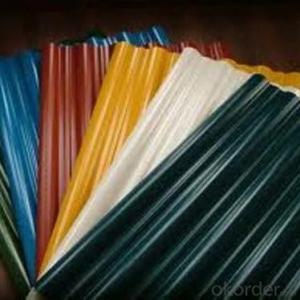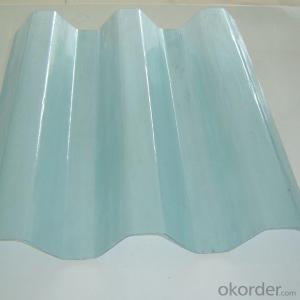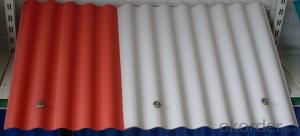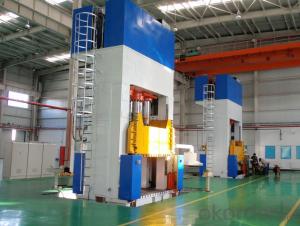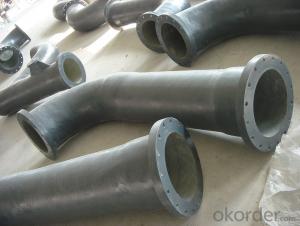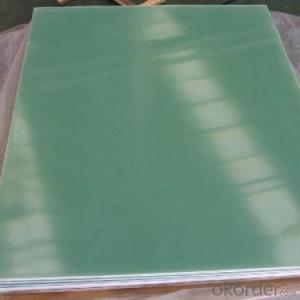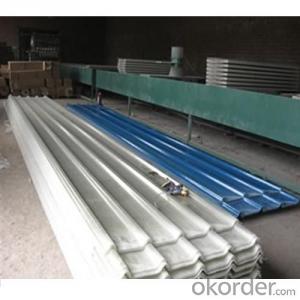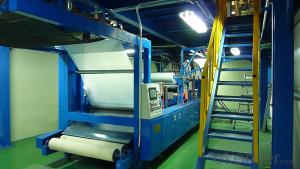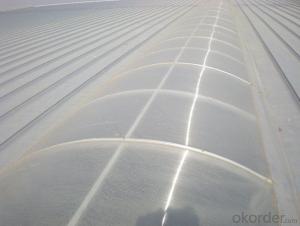High Quality FRP Roofing Panel - Corrugated Roof Sheet for Roofing
- Loading Port:
- Tianjin
- Payment Terms:
- TT OR LC
- Min Order Qty:
- 20 m
- Supply Capability:
- 50000 m/month
OKorder Service Pledge
OKorder Financial Service
You Might Also Like
Specification
PRODUCT DESCRIPTION
FRP GRP Fiberglass Glassfiber Corrugated Roofing is a patent of our company, not like other FRP products, it is produced without yarn, instead, we use mat only. Therefore, the corrugated sheet is more strong in both horizontal and vertical direction.
Fiberglass corrugated sheet is usually used in construction site as protecting facility. It is dagarous for workers in building site since you never know if there is something hard drop down from the high area. So corrugated sheet is installed for preventing the stuff dropping down to hurt people.
Besides, it could also applied as the roof of the constructions.
FEATURES
1). Light Transmission: The light transmission of FRP roof sheet is between 3%-85%. Light through FRP corrugated sheet scatters and is mild. It will not form a light so as to make the indoor brighter.
2). Weather resistant: The UV agent mixing in the corrugated sheet, which can truly resist the damage of ultraviolet ray, which can truly resist the damage of ultraviolet ray.
3). Flame retardant: B1 grade.
4). Anti-corrosion: It resists chemical corrosion and its life span is over 3 times longer than zinc panel.
5). Water proof:100% water proof.
6). Impact capacity: resist impact, tensile and hardly breakable.
SPECIFICATION
| Fiber | E-glass chopped strand mat |
| Resin | Unsaturated polyester |
| Fiber content | 31.50% |
| Thickness | 1.2/ 1.5/ 2.0mm(±10%) |
| Transparent Rate | 30%-90% |
| Length | No limit |
| Gel coating | 150um |
| Warranty | 15/ 25years |
PICTURES
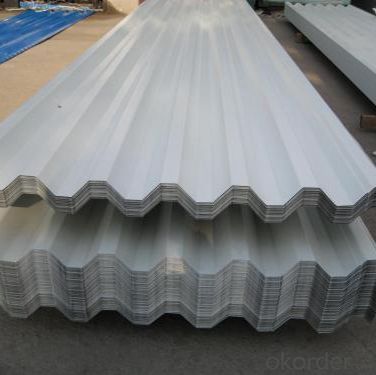
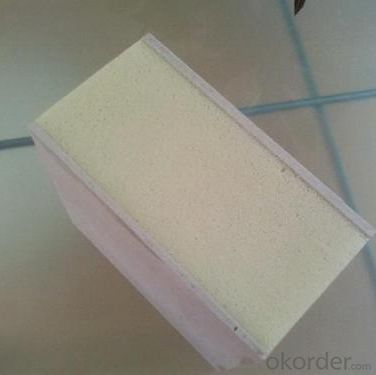
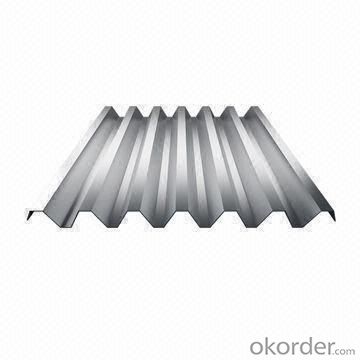
- Q: Can FRP roofing panels be used for retail stores?
- Indeed, retail stores can make use of FRP (Fiberglass Reinforced Plastic) roofing panels. It is not uncommon to find FRP roofing panels in commercial and industrial buildings owing to their durability, versatility, and cost-effectiveness. Being lightweight and simple to install, they are also capable of enduring harsh weather conditions, which renders them appropriate for retail establishments. Moreover, these panels are accessible in a variety of colors and designs, enabling retailers to select a style that harmonizes with their brand identity. Furthermore, FRP roofing panels exhibit resistance to UV rays, chemicals, and corrosion, ensuring that retail establishments have a long-lasting solution at their disposal.
- Q: Can FRP roofing panels be used for agricultural buildings?
- Yes, FRP (Fiberglass Reinforced Plastic) roofing panels can be used for agricultural buildings. These panels are lightweight, durable, and resistant to corrosion, making them suitable for various agricultural applications. They provide excellent protection against weather elements, such as UV rays, rain, and hail, and are also fire-resistant. Additionally, FRP panels are easy to install and maintain, making them a cost-effective choice for agricultural structures.
- Q: Are FRP roofing panels resistant to impact?
- Yes, FRP (Fiberglass Reinforced Plastic) roofing panels are generally resistant to impact. FRP panels are known for their durability and strength, making them able to withstand various types of impact without breaking or cracking. The fiberglass reinforcement in the panels provides extra strength, making them capable of withstanding heavy loads, such as hail or falling debris. Additionally, FRP panels are commonly used in industrial and commercial settings where impact resistance is crucial, such as warehouses, factories, and agricultural buildings. However, it is important to note that the level of impact resistance may vary depending on the specific brand and quality of the FRP roofing panels. It is always recommended to consult with the manufacturer or supplier to ensure that the panels meet the desired impact resistance requirements for a particular project.
- Q: Do FRP roofing panels require any specific type of sealant or adhesive for installation?
- To properly install FRP (Fiberglass Reinforced Plastic) roofing panels, a specific sealant or adhesive is necessary. It is vital to choose a sealant or adhesive that is designed specifically for bonding FRP panels, ensuring a secure and proper installation. A commonly utilized adhesive for FRP roofing panels is a high-strength polyurethane adhesive. This adhesive is renowned for its exceptional bonding properties and its ability to withstand harsh weather conditions. It establishes a strong and durable bond between the FRP panels and the underlying surface, guaranteeing a long-lasting installation. Moreover, it is advisable to employ a sealant that is compatible with FRP panels. This helps create a watertight seal between the panels, preventing any moisture or water infiltration that could potentially cause leaks or damage. When selecting and applying the sealant or adhesive, it is crucial to carefully read and adhere to the manufacturer's instructions. This ensures the correct product is utilized and applied in the appropriate manner, optimizing its performance. In conclusion, the correct sealant or adhesive is pivotal for the successful installation of FRP roofing panels. It establishes a secure and durable bond, as well as a watertight seal, providing protection against the elements and extending the roof's lifespan.
- Q: Are FRP roofing panels suitable for outdoor recreational structures?
- Yes, FRP (Fiberglass Reinforced Plastic) roofing panels are suitable for outdoor recreational structures. FRP panels are known for their durability, strength, and resistance to various weather conditions. They are lightweight, easy to install, and have a long lifespan, making them ideal for outdoor structures such as gazebos, pergolas, and pavilions. One of the key advantages of FRP roofing panels is their resistance to UV radiation. They have a protective gel coating that prevents them from fading or yellowing when exposed to sunlight. This makes them perfect for outdoor recreational structures that are constantly exposed to the elements. Furthermore, FRP panels are highly resistant to corrosion and moisture, making them suitable for areas with high humidity or near coastal regions. They do not rust or rot like traditional roofing materials, which enhances their longevity and reduces maintenance costs. Additionally, FRP panels are available in various colors, styles, and textures, allowing you to choose the one that best suits the aesthetic of your outdoor recreational structure. They can also be translucent, allowing natural light to filter through while providing protection from harmful UV rays. In conclusion, FRP roofing panels are a suitable choice for outdoor recreational structures due to their durability, resistance to weather conditions, and aesthetic options. They provide a long-lasting solution that requires minimal maintenance, making them an excellent investment for any outdoor recreational project.
- Q: Can FRP roofing panels be installed on both residential and commercial loading docks?
- Yes, FRP (Fiberglass Reinforced Plastic) roofing panels can be installed on both residential and commercial loading docks. FRP roofing panels are a popular choice for loading docks due to their durability, lightweight nature, and resistance to corrosion and weathering. They are suitable for both residential and commercial applications as they provide a strong and stable roofing solution. Additionally, FRP roofing panels are easy to install, making them a convenient choice for loading docks of various sizes and types. Whether it is a residential loading dock or a commercial one, FRP roofing panels can be effectively installed to provide reliable protection and longevity.
- Q: Can FRP roofing panels be installed over an existing roof?
- Yes, FRP roofing panels can be installed over an existing roof. However, there are a few factors that need to be considered before proceeding with this installation method. First, the existing roof should be structurally sound and able to support the weight of the FRP panels. Additionally, any existing leaks or damage should be repaired before installing the new panels. It is also important to ensure proper insulation and ventilation to prevent condensation and moisture buildup between the existing roof and the FRP panels. Lastly, it is recommended to consult with a professional roofing contractor who has experience with FRP installations to ensure the best results and adherence to local building codes and regulations.
- Q: Can FRP roofing panels be customized in terms of size and color?
- Yes, FRP roofing panels can be customized in terms of size and color. They can be manufactured to specific dimensions and can also be produced in a variety of colors to suit the aesthetic preferences of the customer.
- Q: Can FRP roofing panels be used for covered walkways or entry canopies?
- Yes, FRP roofing panels can be used for covered walkways or entry canopies. FRP (Fiberglass Reinforced Plastic) roofing panels are lightweight, durable, and weather-resistant, making them a suitable option for these applications. They provide protection from rain, snow, and UV rays while allowing natural light to pass through. Additionally, FRP panels are easy to install and maintain, making them a practical choice for covered walkways or entry canopies.
- Q: Can FRP roofing panels be used for both residential and commercial skylights?
- Yes, FRP roofing panels can be used for both residential and commercial skylights. FRP (Fiberglass Reinforced Plastic) roofing panels are versatile and durable, making them suitable for various applications, including skylights in both residential and commercial buildings.
Send your message to us
High Quality FRP Roofing Panel - Corrugated Roof Sheet for Roofing
- Loading Port:
- Tianjin
- Payment Terms:
- TT OR LC
- Min Order Qty:
- 20 m
- Supply Capability:
- 50000 m/month
OKorder Service Pledge
OKorder Financial Service
Similar products
Hot products
Hot Searches
Related keywords
